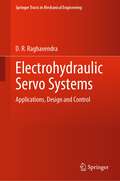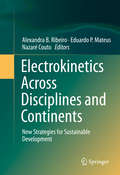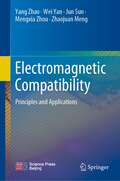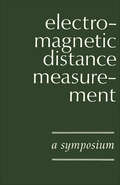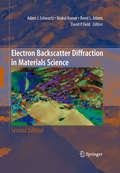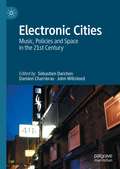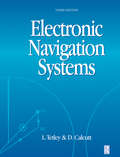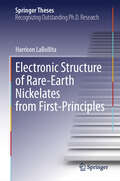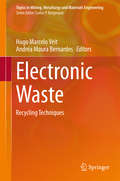- Table View
- List View
Electrohydraulic Servo Systems: Applications, Design and Control (Springer Tracts in Mechanical Engineering)
by D. R. RaghavendraThis book covers the fundamental concepts of electrohydraulic (EH) servo systems in detail and also presents the developments about power, quadratic response, and control flexibility of EH servo systems with applications in aircraft/aerospace engineering, mobile equipment, material/structure testing, motion simulators, and strategic defense sectors. Various topics covered in this books are systems and configurations of servo systems, components, applications, design of SISO and MIMO and control options of SISO and MIMO systems. It further includes a chapter on contamination control, fault detection and diagnosis (FDD) of these systems. The detailed working procedures and advice on implementation routines presented in this book will help readers to apply the control models and systems presented so as to make their own servo systems more efficient. The book will be useful for mechanical engineers and professionals involved in the analysis and design of electrohydraulic control systems, especially in advanced hydraulic industries, the aeronautical and space, and automotive industries. It would also be a useful reference for advanced courses in EH systems.
Electrokinetics Across Disciplines and Continents
by Alexandra B. Ribeiro Eduardo P. Mateus Nazaré CoutoThe socio-economic activities due to world development are promoting increasing pressures on land, creating competition and conflicts, resulting in suboptimal use of resources. Integrated planning and management of land resources is a top subject of Agenda 21 (managed by FAO), which deals with the cross-sectoral aspects of decision-making for the sustainable use and development of natural resources. This is essential for life-support systems and its productive capacity. In this context, there is a need to find new strategies for sustainable development that links social and economic progress with environmental protection and enhancement. Electrokinetic transport processes (EK) uses a low-level direct current as the "cleaning agent". EK has been applied to the remediation of polluted soils and other contaminated matrices. It also shows a great potential to be used in different fields, as in saline soil restoration, nutrients recovery from wastes or repair and maintenance of building structures. EK may be an integrated approach for new strategies aiming at sustainable development and to support waste strategies, with worldwide interest. EK can also be coupled with phytoremediation and integrated with nanotechnology, enlarging the scope of its application. The conciliation of the EK in the recovery of secondary resources, remediation and conservation is a multidisciplinary novel approach that opens new technical possibilities for waste minimization, through upgrading of particulate waste products and the recovery of secondary resources for industrial, agricultural or social use.
Electromagnetic Behaviour of Metallic Wire Structures
by Lei Zhou S. T. ChuiDespite the recent development and interest in the photonics of metallic wire structures, the relatively simple concepts and physics often remain obscured or poorly explained to those who do not specialize in the field. Electromagnetic Behaviour of Metallic Wire Structures provides a clear and coherent guide to understanding these phenomena without excessive numerical calculations. Including both background material and detailed derivations of the various different formulae applied, Electromagnetic Behaviour of Metallic Wire Structures describes how to extend basic circuit theory relating to voltages, currents, and resistances of metallic wire networks to include situations where the currents are no longer spatially uniform along the wire. This lays a foundation for a deeper understanding of the many new phenomena observed in meta-electromagnetic materials. Examples of applications are included to support this new approach making Electromagnetic Behaviour of Metallic Wire Structures a comprehensive and self-contained volume suitable for use by specialists, non-specialist, researchers and professionals in other relevant fields and even students.
Electromagnetic Compatibility: Principles and Applications
by Yang Zhao Wei Yan Jun Sun Mengxia Zhou Zhaojuan MengThis book highlights principles and applications of electromagnetic compatibility (EMC). After introducing the basic concepts, research progress, standardizations and limitations of EMC, the book puts emphasis on presenting the generation mechanisms and suppression principles of conducted electromagnetic interference (EMI) noise, radiated EMI noise, and electromagnetic susceptibility (EMS) problems such as electrostatic discharge (ESD), electric fast transient (EFT) and surge. By showing EMC case studies and solved examples, the book provides effective solutions to practical engineering problems. Students and researchers will be able to use the book as practical reference for EMC-related measurements and problem- solution.
Electromagnetic Distance Measurement
by International Association of GeodesyElectromagnetic distance measurement, by using light and microwaves for direct linear measurements and thus circumventing the need for traditional methods of triangulation, may well introduce a new era in surveying. This book brings together the work of forty-eight geodesists from twenty-five countries. They discuss various new EDM instruments—among them the Tellurometer, Geodimeter, and air- and satellite-borne systems—and investigate the complex sources of error. The book is therefore a unique and comprehensive source on the subject. UNESCO and R.I.C.S. have assisted financially in its production.
Electromagnetic Fields and Waves in Fractional Dimensional Space
by Muhammad Zubair Qaisar Abbas Naqvi Muhammad Junaid MughalThis book presents the concept of fractional dimensional space applied to the use of electromagnetic fields and waves. It provides demonstrates the advantages in studying the behavior of electromagnetic fields and waves in fractal media. The book presents novel fractional space generalization of the differential electromagnetic equations is provided as well as a new form of vector differential operators is formulated in fractional space. Using these modified vector differential operators, the classical Maxwell's electromagnetic equations are worked out. The Laplace's, Poisson's and Helmholtz's equations in fractional space are derived by using modified vector differential operators.
Electromagnetic Form Factors of Charmed Baryons in Lattice QCD (Springer Theses)
by Kadir Utku CanThis thesis presents the first lattice quantum chromodynamics (QCD) approach to the charmed baryon regime, building on the knowledge and experience gained with former lattice QCD applications to nucleon structure. The thesis provides valuable insights into the dynamics of yet unobserved charmed baryon systems. Most notably, it confirms that the expectations of model or effective field theoretical calculations of heavy-hadron systems hold qualitatively, while also demonstrating that they conflict with the quantitative results, pointing to a tension between these complementary approaches. Further, the book presents a cutting-edge approach to understanding the structure and dynamics of hadrons made of quarks and gluons using QCD, and successfully extends the approach to charmed hadrons. In particular, the thesis investigate a peculiar property of charmed hadrons whose dynamics, i.e., structure, deviates from their counterparts, e.g., those of protons and neutrons, by employing the lattice QCD approach —a state-of-the-art numerical method and the powerful ab initio, non-perturbative method.
Electromagnetic Metamaterials and Metasurfaces: From Theory To Applications
by Yan Shi Tie Jun Cui Long LiThe subject of this book is the fast-developing area of research known as metamaterials/metasurfaces and some of their engineering applications. This book comprehensively presents the state of the art of metamaterials/metasurfaces from theory to applications. The theoretical side includes electrodynamics of left-handed medium, generalized Snell's law, digital coding metamaterials/metasurfaces, group theory of metamaterials, information metamaterials and metasurfaces, etc. On the application side, a wide range of design examples are discussed, including metamaterial antennas, electromagnetic interference, frequency selective surfaces, wireless power transmission and energy harvesting, cloaking and radar cross section reduction, orbital angular momentum, wireless communication, imaging, etc. The book provides researchers, engineers, and graduate students with a variety of new discoveries, results, information, and knowledge in the field of metamaterials and metasurfaces.
Electromagnetic Metamaterials: Modern Insights into Macroscopic Electromagnetic Fields (Springer Series in Materials Science #287)
by Kazuaki SakodaThis book presents novel and fundamental aspects of metamaterials, which have been overlooked in most previous publications, including chirality, non-reciprocity, and the Dirac-cone formation. It also describes the cutting-edge achievements of experimental studies in the last several years: the development of high-regularity metasurfaces in optical frequencies, high-performance components in the terahertz range, and active, chiral, nonlinear and non-reciprocal metamaterials in the microwave range. Presented here are unique features such as tunable metamaterials based on the discharge plasma, selective thermal emission from plasmonic metasurfaces, and the classical analogue of the electromagnetically induced transparency. These most advanced research achievements are explained in understandable terms by experts in each topic. The descriptions with many practical examples facilitate learning, and not only researchers and experts in this field but also graduate students can read the book without difficulty. The reader finds how these new concepts and new developments are being utilized for practical applications.
Electromagnetic Seabed Logging
by Stéphane SainsonSeabed logging (SBL) gathers the electromagnetic methods of marine subsoil exploration and more specifically those dedicated to the exploration of oil and gas at sea.Appeared in 2000, these techniques, with more than 500 industrial jobs, present after 15 years of commercial success a discovery record rate of nearly 90 % and seem now to turn the world in the offshore exploration field.Proposing a serious index of the presence of hydrocarbons , electromagnetic SBL coupled with seismic reflection survey is probably the first reliable method for direct detection of hydrocarbons. Complementing the structural concepts of oil exploration used since the 1920s, the SBL now radically modifies the approach and the philosophies of exploration especially those then including drilling and well logging activities. Electromagnetic Seabed Logging: a new tool for oil and gas prospecting, which original publication in French was in 2012, presents these methods, its principles, advantages, limitations, instruments, modeling and applications. It is also designed to be a tool for a reflection on the use of electromagnetic energy for the exploration in a conductive medium as sea water thus setting the theoretical and practical limits of these investigations for future developments. This book is intended of course for the geophysicists and the petroleum geologists, but also for the earth scientists, the reservoir engineers and the log analysts
Electromagnetic Sources and Electromagnetic Fields (Modern Antenna)
by Gaobiao XiaoThis book presents a modified spherical harmonic expansion method in which the electromagnetic fields and their sources are expanded with the same set of spherical vector basis functions in a similar procedure. Explicit expressions for the electromagnetic fields, potentials, energies, and the related Green’s functions are derived for the spherical modes in both frequency domain and time domain. Based on the formulation, the relationships between the electromagnetic sources, the electromagnetic far fields, and the electromagnetic near fields are clearly revealed. In particular, a nonuniform transmission line model is developed for intuitively characterizing the total radiation process. The introduction of the cutoff radius and the cutoff mode degree provides a simple reference for determining the numbers of degrees of freedom of the fields associated with sources in a bounded region. Based on the theory, an efficient hybrid method for synthesizing antenna arrays with complex footprints is proposed and demonstrated with several numerical examples. Effective algorithms are also developed for reconstructing the radiating part of the current sources.This book is intended for researchers, engineers, and graduate students who are interested in studying the energy transfer in electromagnetic radiation, synthesis and measurement of antenna arrays, and applications of inverse electromagnetic source problems.
Electromagnetic Waves and Optics: A Linear Systems Approach
by Navin KhanejaThe book explores electromagnetic (EM) waves, which are present everywhere—from radio, television, and cell phones to satellite dishes, antennas, and WiFi. The propagation of EM waves is governed by Maxwell's equations. When these waves pass through a medium, they slow down and refract, while in a metallic medium, they are reflected. Metallic boxes and pipes can store and direct EM waves, known as cavities and waveguides. Oscillating currents generate and transmit EM waves through antennas, allowing for long-distance communication after the waves propagate. Since oscillating currents emit EM waves, the author uses coaxial cables and transmission lines to reduce radiation and carry high-frequency currents efficiently. EM waves at very high frequencies in the optical range are responsible for transmitting visual information. The author also discusses lenses and optical instruments like telescopes and microscopes, which are used to magnify optical signals. Additionally, the quantum mechanical origins of a material’s permittivity, which affects the speed of light through the medium, are examined.
Electromagnetic and Optical Pulse Propagation: Volume 1: Spectral Representations in Temporally Dispersive Media (Springer Series in Optical Sciences #224)
by Kurt E. OughstunThis volume presents a detailed, rigorous treatment of the fundamental theory of electromagnetic pulse propagation in causally dispersive media that is applicable to dielectric, conducting, and semiconducting media. Asymptotic methods of approximation based upon saddle point methods are presented in detail.
Electromagnetic and Optical Pulse Propagation: Volume 2: Temporal Pulse Dynamics in Dispersive Attenuative Media (Springer Series in Optical Sciences #225)
by Kurt E. OughstunIn two volumes, this book presents a detailed, systematic treatment of electromagnetics with application to the propagation of transient electromagnetic fields (including ultrawideband signals and ultrashort pulses) in dispersive attenuative media. The development in this expanded, updated, and reorganized new edition is mathematically rigorous, progressing from classical theory to the asymptotic description of pulsed wave fields in Debye and Lorentz model dielectrics, Drude model conductors, and composite model semiconductors. It will be of use to researchers as a resource on electromagnetic radiation and wave propagation theory with applications to ground and foliage penetrating radar, medical imaging, communications, and safety issues associated with ultrawideband pulsed fields. With meaningful exercises, and an authoritative selection of topics, it can also be used as a textbook to prepare graduate students for research. Volume 2 presents a detailed asymptotic description of plane wave pulse propagation in dielectric, conducting, and semiconducting materials as described by the classical Lorentz model of dielectric resonance, the Rocard-Powles-Debye model of orientational polarization, and the Drude model of metals. The rigorous description of the signal velocity of a pulse in a dispersive material is presented in connection with the question of superluminal pulse propagation. The second edition contains new material on the effects of spatial dispersion on precursor formation, and pulse transmission into a dispersive half space and into multilayered media. Volume 1 covers spectral representations in temporally dispersive media.
Electromagnetism: With Solved Problems (Undergraduate Texts in Physics)
by Hiqmet KamberajAny curriculum involving science and/or engineering will eventually find itself entering the realm of physics. This book seeks to introduce students to a number of the fundamental concepts in physics and illustrate how different theories were developed out of physical observations and phenomena. The book presents multi-chapter sections on electrostatics, magnetism and electromagnetic waves, with eyes on both the past and the future, touching, along the way, on Coulomb, Gauss, Maxwell, Ohm, Biot-Savart, Ampere, Faraday, Fresnel and Lorentz. The book also contains an appendix that provides the reader with a portion of the mathematical background of vector analysis and vector differential operators. The book approaches its topics through a focus on examples and problem-solving techniques, illustrating vividly how physical theories are applied to problems in engineering and science. The book is primarily aimed at undergraduate students in these two fields, but it also features chapters that are geared towards senior undergraduates working on their final year theses.
Electrometallurgical Techniques for DOE Spent Fuel Treatment: FINAL REPORT
by Committee on Electrometallurgical Techniques for DOE Spent Fuel TreatmentThe National Academies Press (NAP)--publisher for the National Academies--publishes more than 200 books a year offering the most authoritative views, definitive information, and groundbreaking recommendations on a wide range of topics in science, engineering, and health. Our books are unique in that they are authored by the nation's leading experts in every scientific field.
Electron Backscatter Diffraction in Materials Science
by Brent L. Adams Mukul Kumar Adam J. Schwartz David P. FieldElectron backscatter diffraction is a very powerful and relatively new materials characterization technique aimed at the determination of crystallographic texture, grain boundary character distributions, lattice strain, phase identification, and much more. The purpose of this book is to provide the fundamental basis for electron backscatter diffraction in materials science, the current state of both hardware and software, and illustrative examples of the applications of electron backscatter diffraction to a wide-range of materials including undeformed and deformed metals and alloys, ceramics, and superconductors. The text has been substantially revised from the first edition, and the authors have kept the format as close as possible to the first edition text. The new developments covered in this book include a more comphrensive coverage of the fundamentals not covered in the first edition or other books in the field, the advances in hardware and software since the first edition was published, and current examples of application of electron backscatter diffraction to solve challenging problems in materials science and condensed-matter physics.
Electron Localization-Delocalization Matrices (Lecture Notes in Chemistry #112)
by Chérif F. Matta Ronald Cook Paul W. AyersThis book builds bridges between two yet separated branches of theoretical and mathematical chemistry: Chemical Graph Theory and Electronic Structure Calculations. Although either of the fields have developed their own techniques, problems, methods, and favorite benchmark cases independent from each other, the authors have managed to bring them together by using the localization-delocalization matrix (LDM). The LDM is a novel molecular descriptor that fingerprints a molecule by condensing the complicated electronic information in one, mathematically manageable, object. In this book, the authors introduce the readers to modeling techniques based on LDMs. Their technique offers a high accuracy as well as robust predictive power, often dramatically surpassing the potential of either of the constituting methods on their own. In addition to the comprehensive and accessible introduction to this new field of theoretical chemistry, the authors offer their self-developed software free to download, so that readers can try running their own simulations. The described methods are very general and can easily be implemented for calculating various properties and parameters such as mosquito repelling activity, ionic liquid properties, local aromaticity of ring molecules, log P's, pKa's, LD50, corrosion inhibition activities, and Lewis acidities and basicities – to only name a few. The free downloadable software helps readers automate the analysis of the matrices described in this book and hence facilitates application of the described methodology.
Electron Waves in Solids: Exploring the Foundations of Modern Technology (Springer Series in Solid-State Sciences #203)
by Navin KhanejaThis book explores the intricate world of electron behavior within solids, revealing them to be waves—a fundamental insight crucial to grasping modern electronics, computing, and solid-state devices. This comprehensive examination elucidates the factors determining material conductivity, distinguishing between conductors, insulators, and semiconductors. Through detailed analysis, the text illuminates the thermal agitation of solids, manifesting as vibrations known as phonons, which impede electron flow and contribute to electrical resistance. Readers gain insight into the production of electronic devices through semiconductor doping, exploring various device types and their functionalities. The book further investigates the temperature-dependent behavior of metal resistance, including the phenomenon of superconductivity, wherein resistance vanishes entirely at low temperatures—a phenomenon comprehensively elucidated within these pages. Moreover, the text unravels the mysteries of magnetism in solids, exploring how certain metals, such as iron, exhibit permanent magnetism. By probing into the underlying causes of magnetism, readers gain a deeper understanding of solid-state physics. Additionally, the book explores imaging techniques such as X-rays, offering insights into how scientists peer inside solids to decipher their internal structures and properties. Geared toward scientists and engineers, the book serves as an indispensable resource for mastering the foundational concepts of solid-state physics—a discipline indispensable to modern technology.
Electronic Cities: Music, Policies and Space in the 21st Century
by Sébastien Darchen Damien Charrieras John WillsteedThis book examines Electronic Dance Music (EDM) scenes in 18 cities across Africa, the Middle East, Europe, Asia, North America and Australia. It focuses on the historical development of these scenes, with an emphasis on the post-2000 context, including the COVID-19 pandemic and its far-reaching effects. Expert contributors highlight the influence of geographical contexts, as well as cultural and political histories, in the development of mainstream EDM scenes and underground Electronic Dance Music Cultures. This expansive work offers additional insights on cultural and creative policies, planning interventions and regulations associated with nightlife management, and provides a detailed analysis of current challenges inherent to the governance of EDM scenes in contemporary cities.
Electronic Navigation Systems
by David Calcutt Laurie TetleyMaritime navigation has rapidly developed since the publication of the last edition of the title with methods of global position fixing for shipping becoming standardized. As in the previous two editions, this edition will provide a sound basis for the understanding of modern navigation systems and brings the student or professional up-to-date with the latest developments in technology and the growing standardization of maritime navigation techniques. Developed with close scrutiny from the US Merchant Marine Academy and the major maritime navigation centres in the UK, out-dated techniques have been replaced by an expanded section on the now standard Navstar GPS systems and the Integrated Nav. In addition, a new chapter on the application of electronic charts will also be included, as well as problems at the end of each chapter with worked solutions.
Electronic Phase Separation in Magnetic and Superconducting Materials: Recent Advances (Springer Series in Solid-State Sciences #201)
by Maxim Yu. Kagan Kliment I. Kugel Alexander L. Rakhmanov Artem O. SboychakovThis book focuses on nanoscale electronic phase separation in a wide class of different materials, especially in strongly correlated electron systems. It features an extensive review of the field of inhomogeneous spin and charge states in condensed matter physics while delivering a topical and timely discussion of a wide range of recent advances in electronic phase separation. It describes the formation of different types of nanoscale ferromagnetic metallic droplets in antiferromagnetically ordered, charge-ordered, or orbitally-ordered insulating matrices, as well as the colossal magnetoresistance effect and tunneling electron transport in the nonmetallic phase-separated state of complex magnetic oxides. It also discusses compounds with spin-state transitions, inhomogeneously phase-separated states in strongly correlated multiband systems, and the electron polaron effect, paying special attention to systems with imperfect Fermi surface-nesting such as chromium alloys, iron-based pnictides, and AA-stacked graphene bilayers. The authors investigate also the formation of order parameter clusters and insulator-superconductor transition in different superconducting systems including bismuth oxides, two-dimensional films in the presence of strong disorder, as well as inhomogeneous Fermi-Bose mixtures in Aharonov-Bohm rings with a superconducting bridge in a topologically nontrivial state. This book is a valuable resource for researchers involved in theoretical and experimental studies of strongly correlated materials, such as magnetic semiconductors, Fermi-Bose mixtures, and twisted bilayer graphene.
Electronic Properties of Materials: An Introduction Engineers
by Rolf E. HummelThis text on the electrical, optical, magnetic, and thermal properties of materials stresses concepts rather than mathematical formalism. Suitable for advanced undergraduates, it is intended for materials and electrical engineers who want to gain a fundamental understanding of alloys, semiconductor devices, lasers, magnetic materials, and so forth. The book is organized to be used in a one-semester course; to that end each section of applications, after the introduction to the fundamentals of electron theory, can be read independently of the others. Many examples from engineering practice serve to provide an understanding of common devices and methods. Among the modern applications covered are: high-temperature superconductors, optoelectronic materials, semiconductor device fabrication, xerography, magneto-optic memories, and amorphous ferromagnetics. The fourth edition has been revised and updated with an emphasis on the applications sections, which now cover devices of the next generation of electronics.
Electronic Structure of Rare-Earth Nickelates from First-Principles (Springer Theses)
by Harrison LaBollitaThis thesis demonstrates the value of theoretical approaches in the discovery of new superconducting materials. It reports a detailed study of the recently discovered nickel-oxide (nickelate) superconductors using multiple first-principles computational tools, from density functional theory to dynamical mean field theory. In the context of superconductivity, discoveries have generally been linked to serendipitous experimental discovery; this thesis reports some of the few examples of predictions of new superconductors that have later been realized in practice, a prime example of the significance of the methodology it expounds. Overall, it represents a seminal systematic work in the electronic structure theory of the emergent field of nickelate superconductivity.
Electronic Waste
by Hugo Marcelo Veit Andréa Moura BernardesThis book presents an overview of the characterization of electronic waste. In addition, processing techniques for the recovery of metals, polymers and ceramics are described. This book serves as a source of information and as an educational technical reference for practicing scientists and engineers, as well as for students.
